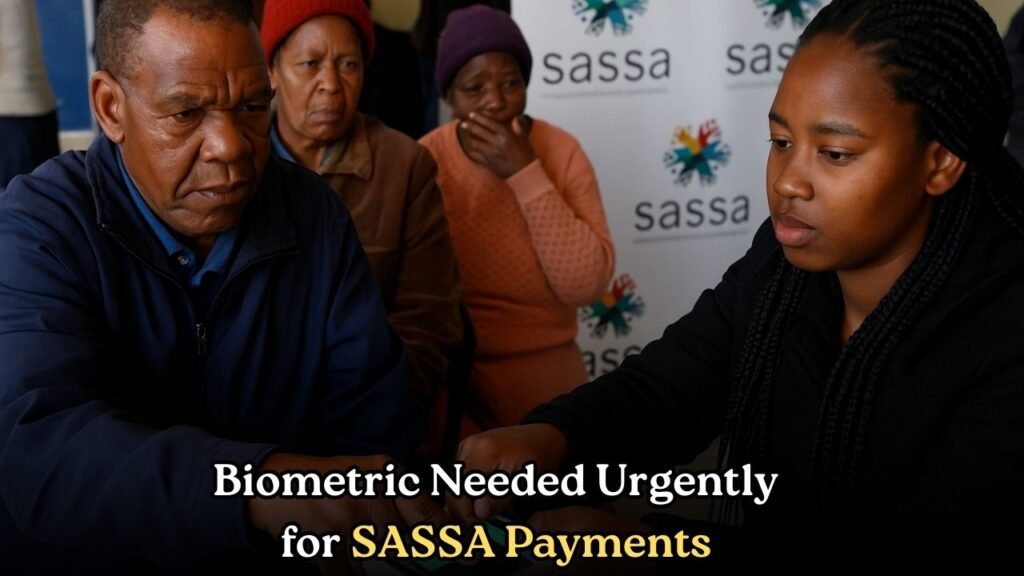SASSA Mandates Biometric Verification for Grant Recipients: In a significant move aimed at enhancing security and reducing fraud, the South African Social Security Agency (SASSA) has introduced biometric verification for all grant recipients. This initiative is a part of SASSA’s ongoing efforts to ensure that social grants reach the rightful beneficiaries without any discrepancies or misuse. By incorporating biometric technology, SASSA aims to streamline the verification process, making it more secure and efficient. This new system requires grant recipients to register their biometric data, such as fingerprints, which will be used to authenticate their identity during the grant collection process. The implementation of this technology is expected to improve the overall efficacy of grant distribution, ensuring that funds are allocated correctly and securely.

Understanding the New Biometric Verification System
With the introduction of the biometric verification system, SASSA is setting a new standard for grant authentication in South Africa. This system requires recipients to provide unique biometric data, which includes fingerprint scanning, to confirm their identity. The primary goal is to prevent fraudulent activities that have plagued the grant distribution system in the past. By utilizing biometric data, SASSA can accurately verify the identity of grant recipients, ensuring that the correct individuals receive their entitled benefits. This method not only enhances security but also simplifies the process for beneficiaries, reducing the need for physical documents and making grant collection more convenient. The implementation of biometric verification is a proactive step towards safeguarding the integrity of the social grant system, providing a secure and reliable method for recipients to access their funds.
The Impact on Current and Future Grant Recipients
The introduction of biometric verification will have a significant impact on both current and future grant recipients. For existing beneficiaries, the transition to this system means that they will need to undergo the biometric registration process to continue receiving their grants. SASSA has assured that this process will be straightforward and accessible, with facilities available to assist recipients in registering their biometric data. For new applicants, biometric verification will be integrated into the application process, providing a seamless and secure method of identity authentication from the outset. This change is expected to foster trust and confidence in the grant distribution system, as it significantly reduces the risk of identity theft and fraudulent claims. By ensuring that only eligible individuals receive social grants, SASSA is reinforcing its commitment to supporting vulnerable South Africans effectively and transparently.
Challenges and Concerns with Biometric Verification
While the biometric verification system promises enhanced security and efficiency, it also presents certain challenges and concerns that need to be addressed. One of the primary challenges is ensuring that all grant recipients, including those in remote or rural areas, have access to the necessary facilities for biometric registration. SASSA must work to ensure that the biometric enrolment process is inclusive and accessible to prevent any potential exclusion of eligible beneficiaries. Additionally, there are concerns regarding the privacy and protection of biometric data. It is crucial for SASSA to implement robust data protection measures to safeguard recipients’ personal information and prevent any potential misuse. Educating beneficiaries about the benefits and safety of biometric verification is essential to gaining their trust and cooperation. By addressing these challenges, SASSA can ensure a smooth transition to the biometric system, ultimately enhancing the effectiveness of social grant distribution.
Future Prospects for SASSA’s Biometric System
Looking ahead, SASSA’s adoption of biometric verification paves the way for future advancements in the management and distribution of social grants. As technology continues to evolve, the use of biometric data could be expanded to include additional features such as facial recognition or iris scanning, further enhancing the security and reliability of the system. This technological evolution will require continuous investment in infrastructure and training to ensure that the system remains efficient and effective. Furthermore, the successful implementation of biometric verification could serve as a model for other government agencies and programs, demonstrating the potential benefits of leveraging technology to improve service delivery. By staying at the forefront of technological advancements, SASSA can continue to enhance its services, ensuring that social grants are distributed fairly and securely to those who need them most.




